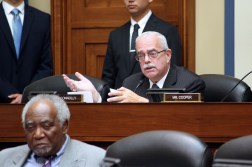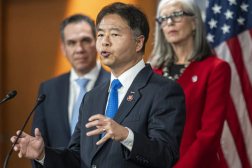Obama threatens veto of defense bill over tech outpost funding

President Barack Obama is threatening a veto of the annual defense policy bill, in part because it eliminates funding for the Pentagon’s newly formed Silicon Valley startup-focused outpost — the Defense Innovation Unit Experimental, or DIUx.
In a statement of administration policy on the fiscal year 2017 National Defense Authorization Act, the Office of Management and Budget says it opposes the “complete elimination of the investment funding associated with” DIUx — DOD’s outreach effort launched last October to bridge the gap between the Pentagon and West Coast innovation.
The House Armed Services Committee proposes, in a line item in the bill’s funding tables, zeroing out the $30 million requested by DOD in the president’s budget plan for fiscal year 2017 for the R&D program that houses DIUx.

“While relatively modest compared to the Department’s overall budget, these investments will enable the development of leading-edge, primarily asymmetric capabilities and help spur development of new ways of warfighting to counter advanced adversaries,” says the OMB memo, issued Monday.
“In order to sustain technological superiority, the Department must take advantage of the rapid evolution of emerging commercial technologies that, when integrated with military systems and novel concept of operations, will be a source of battlefield advantage.”
DOD also requested $14.7 million in operation and maintenance funding in fiscal year 2017 for DIUx, according to DOD documents. That funding would go toward “infrastructure and operational needs” of DIUx. The NDAA does not break O&M funding down into a line item for DIUx, so it’s unclear if there is a proposed cut in this budget stream as well.
The House Armed Services Committee did not respond to FedScoop’s request for clarification or comment.
The most recent text of the 2017 NDAA would also ensure that DIUx got no more than 80 percent of any funding authorized until Defense Secretary Ash Carter issues a report to Congress about the effectiveness of the new unit and the process for coordinating it with other similar DOD entities, like the Defense Advanced Research Projects Agency and nonprofit intelligence investment firm In-Q-Tel.
Carter appears to have gotten the hint from Congress that his Silicon Valley pet project is on the hot seat. Last week in his fourth visit to the area since taking over as secretary, Carter announced a major overhaul of DIUx leadership and a second outpost in Boston.
[Read more: Ash Carter launches DIUx 2.0 with new leadership, Boston office]
“Doing business with the tech industry forces DOD to look ourselves in the mirror, which is healthy for any organization,” he said in a May 11 speech at DIUx’s Moffett Airfield headquarters in Mountain View, California. “In this case, it’s helped us not only identify successes but also our shortcomings, both in how we engage with tech companies here and in the tools we use to accelerate the uptake of technology in the department.”
Carter’s moves in part address concerns from the House Armed Services Committee’s Subcommittee for Emerging Threats and Capabilities that DIUx is too heavily focused on partnering with innovators in a single region and disregarding other barriers that might be limiting DOD innovation.
“The committee believes DIUx to be a helpful step in bridging those communities, but is concerned by the pinpoint focus on one geographic region, as well as the dedication of significant funding at such a nascent period in the development of this organization and the concept on which it was founded,” the subcommittee’s proposal to the 2017 NDAA said.
“The committee is concerned that outreach is proceeding without sufficient attention being paid to breaking down the barriers that have traditionally prevented nontraditional contractors from supporting defense needs, like lengthy contracting processes and the inability to transition technologies.”
OMB memo also opposes the NDAA’s proposed moves to elevate the U.S. Cyber Command to its own combatant command, restrict a small business set-aside threshold increase that would make it easier for emerging tech companies to work with DOD, and cut overseas contingency operations funding for U.S. efforts to counter ISIL, among other things.
Contact the reporter on this story via email at Billy.Mitchell@FedScoop.com or follow him on Twitter @BillyMitchell89. Subscribe to the Daily Scoop to get all the federal IT news you need in your inbox every morning at fdscp.com/sign-me-on.





